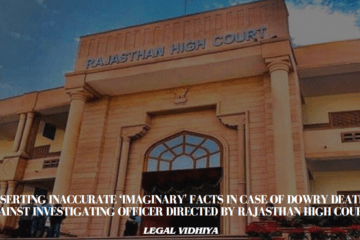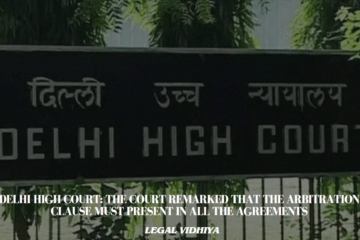
Chatrapal v. The State of Uttar Pradesh & Anr is a legal case in the Civil Court of Bareilly involving the recruitment, wage disparity, inappropriate behaviour charges, departmental investigation, and termination of a former Process Server. The case explores the process of justice, penalty severity, the legality of the firing decision, and the handling of the department’s investigation. The verdict was affirmed by the High Court of Judicature after Chatrapal filed appeals and a Writ Petition.
In this case of Chatrapal v. The State of Uttar Pradesh & Anr. Chatrapal was appointed as a Process Server to a less prestigious job and faced wage inequality. He filed a complaint with District Judge Bareilly, seeking compensation for misbehaviour charges. A supervisory examination was conducted, and Chatrapal was declared responsible for the offenses and He was terminating from his duties. He challenged the termination ruling by filing an appeal before the High Court of Allahabad of Judicature, but the High Court maintained the decision, leading to his ongoing suspension. Chatrapal also submitted a Writ Petition, which was also denied, continuation of the court’s decision that Chatrapal was not to be served.
The Chatrapal vs. The State of Uttar Pradesh & Anr case revolves around pay disparities, allegations of improper behaviour, departmental investigations, the severity of penalties, legal procedure, and the dismissal decision. Chatrapal, a processes Server, faced financial difficulties and was accused of misbehaviour, false accusations, and improper language. The validity and impartiality of the governmental inquiry were questioned, as were the severity of the punishment, including Chatrapal termination. The primary questions in this legal argument revolve around remuneration disparities, inappropriate behaviour claims, departmental investigations, the severity of penalties, justice in procedure, and the legitimacy of the termination order.
The Indian Supreme Court ruled in Chatrapal v. The State of Uttar Pradesh & Anr., a case involving a Class-IV employee who was charged with inappropriate behavior and demotion from his employer. The court found that Chatrapal used abusive language, invented charges against officials, and submitted correspondence beyond the appropriate procedure. The verdict acknowledged the significant offences and their impact on employment conditions. The court also emphasized the legitimacy and impartiality of the departmental investigation, highlighting the innocence verdicts and supporting documentation. The court upheld the demotion order and discussed procedural justice, highlighting the importance of upholding standards of conduct in the public service industry. The court also assessed the proportionality of Chatrapal’s punishment, emphasizing the need for disciplinary procedures to align with natural justice values and the seriousness of the offense.
The Supreme Court of India has upheld the removal of Chatrapal from office, based on allegations of wrongdoing. The decision was fair and equitable, ensuring Chatrapal had an equal chance to present his case. The decision has significant implications for the public sector, emphasizing the importance of maintaining regulation, conduct norms, and accountability in disciplinary procedures. The court’s decision in Chatrapal v. the State of Uttar Pradesh & Anr. affirms Chatrapal’s termination and the significance of accountability, justice, and discipline in the public sector.
In general, The Supreme Court of India has upheld Chatrapal suspension from office for inappropriate behaviour, including using inappropriate language, false accusations, and unauthorized communication. The judge affirmed the disciplinary system Authority’s and High Court’s decisions, setting a precedent for ensuring norms of actions and fixing inappropriate conduct among public servants, reinforcing the value of discipline, responsibility, and ethics in the field of work.
Case Title: Chatrapal vs. The State of Uttar Pradesh & Anr.
NAME: SHRIDEVI C. KOTKAR, B.A, LLB COLLEGE: AZIM PREMJI UNIVERSITY, BANGALORE, INTERN UNDER LEGAL VIDHIYA
Disclaimer: The materials provided herein are intended solely for informational purposes. Accessing or using the site or the materials does not establish an attorney-client relationship. The information presented on this site is not to be construed as legal or professional advice, and it should not be relied upon for such purposes or used as a substitute for advice from a licensed attorney in your state. Additionally, the viewpoint presented by the author is of a personal nature.




0 Comments